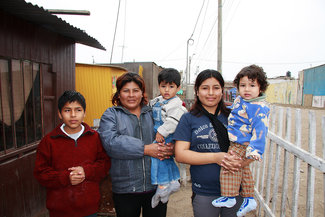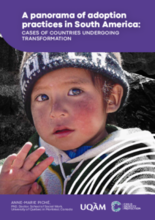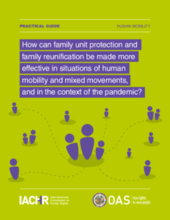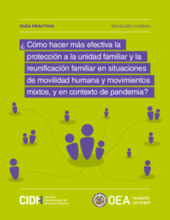

Displaying 41 - 50 of 346
The Task Force on Foster Care of the Transforming Children's Care Global Collaborative Platform held the second spotlight webinar series on identifying foster carers on 5 May 2022.
COVID-19 has left many of Peru's children orphaned, placing severe strain on surviving family members to provide care for those left behind.
This research brought together the testimonies of adoption professionals (national and international) concerned with the situation of abandoned and placed children in five South American countries: Argentina, Bolivia, Chile, Colombia and Peru. The aim of this study is to gain a better understanding of the new realities of adoption, in a context where these countries have chosen to limit or stop their foreign adoption practices.
On their trek north towards the United States, some 19,000 migrant children have crossed the dangerous jungles that sprawl the border between Panama and Colombia so far this year, the United Nations children's agency UNICEF said October 11, 2021.
The guide recommends a series of measures aimed at States, which focus on protecting family unity, preventing separation, and ensuring reunification in the context of human mobility, including for unaccompanied or separated children and adolescents, who require international protection or who leave their homes in search of better opportunities or family reunification.
Black children have access to just 1 cent for every dollar enjoyed by their white counterparts, new research shows, and Hispanic kids fare little better.
In this How We Care series, Family for Every Child has presented the programming of 3 of its CSO members who have been working on the ground on preventing domestic violence affecting children during COVID-19.
This study consists of an analysis of government digital policies focused on children in Uruguay between 2009 and 2019. To facilitate this, the CRC was used as a framework to categorise key features of the principal strategies that have been implemented. It argues that while great advances have been made in terms of digital access, this has not been sufficiently accompanied with comprehensive and child-centred solutions that encompass regulations and children and adult digital education.
Join this online event to learn what kinship care looks like in different contexts and why recognising it is so important.
la Comisión Interamericana presenta la guía ¿Cómo hacer más
efectiva la protección a la unidad familiar y reunificar a la familia en los procedimientos migratorios y de protección en contexto de pandemia? en la que
se analizan los estándares interamericanos aplicables a la luz de las obligaciones
internacionales de los Estados y propone recomendaciones para garantizar la unidad
familiar y la reunificación familiar así como prevenir los riesgos de separación y minimizar los impactos en los casos de separación familiar. Asimismo, la implementación
de las garantías de la reunificación familiar requiere muchas veces de una estrategia idónea de acceso a mecanismos de regularización documental, así como de condiciones seguras de viaje y movilidad a través de las fronteras nacionales. Esto es especialmente benéfico para familias que se han visto separadas de manera forzada o por
razones asociadas a la movilidad humana.



